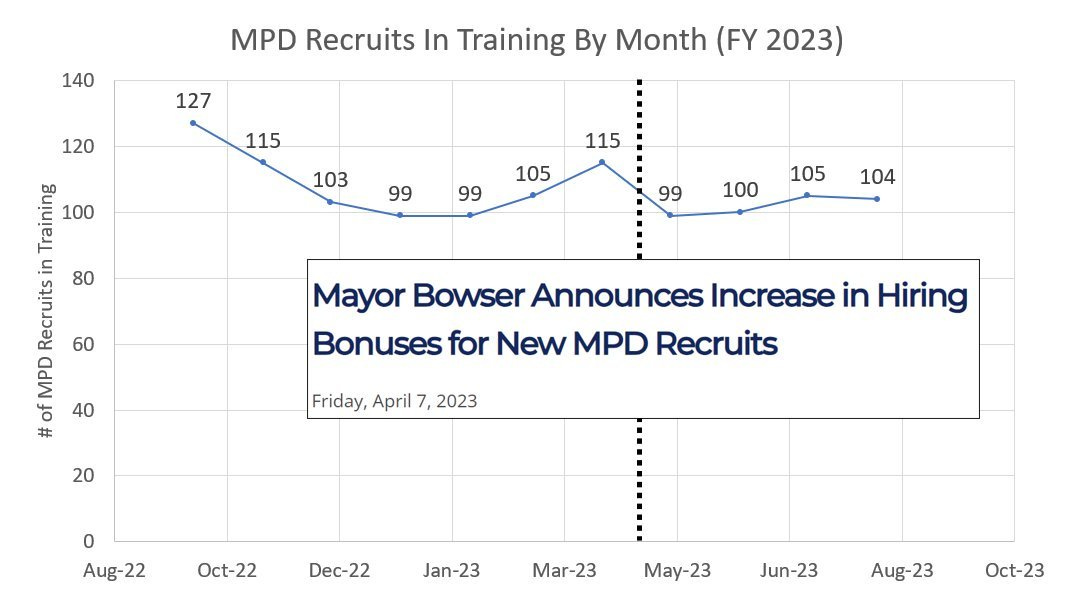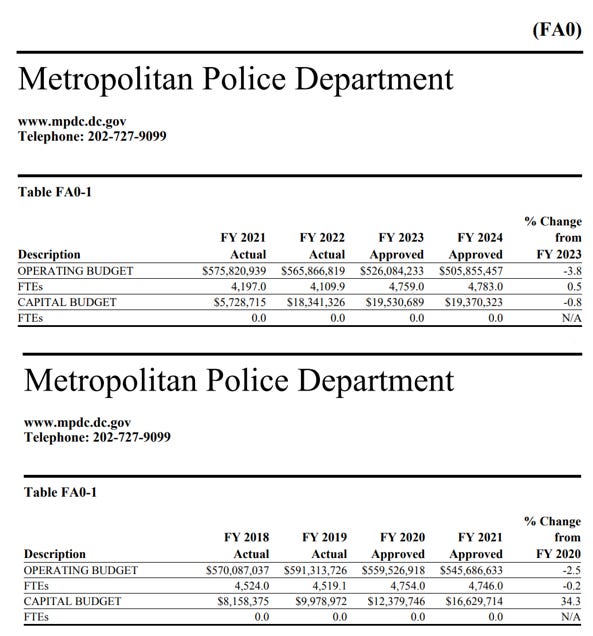Getting serious about recruiting more police
Despite optimistic rhetoric and increased bonuses, MPD is still shrinking
One of the biggest disconnects in DC is the gap between politician rhetoric about adding more police officers and the reality of the Metropolitan Police Department’s (MPD) continued attrition. Mayor Bowser and some Councilmembers have repeatedly talked about how they are growing MPD’s ranks to 4,000 officers:
Those goals haven’t translated into actual staffing as MPD has continued to shrink (like most other police departments across America) due to retirements & resignations outpacing recruitment:
The Bowser administration again touted its focus on MPD staffing this week when they correctly pushed back on CM Trayon White’s call for the National Guard to be mobilized to address DC’s crime (please see this thread if you’re interested in why this is a bad idea). Deputy Mayor Lindsey Appiah included this line in her response:
Unfortunately, despite the Mayor and Council doubling MPD’s recruitment budget in Fiscal Year (FY) 2023, recruitment is down 35% from FY 2022:
In April Mayor Bowser again increased MPD’s hiring bonuses from $20,000 to $25,000 but unsurprisingly it hasn’t worked:
The reason this is unsurprising is that officers’ complaints about MPD aren’t about the pay. On Glassdoor.com in fact officer reviews of MPD are generally positive about the pay and benefits while being abysmal about the organization’s culture, leadership and work-life balance:
The Glassdoor reviews align with officer responses to the PERF survey so we can be pretty confident that this is what MPD officers are telling friends and relatives who might be interested in joining the department. Addressing these workplace issues is almost certainly a requirement to improving both recruitment and retention.
One less-reported fact is that despite the “pathway to 4,000 sworn officers” rhetoric, DC’s government is planning for MPD to continue to shrink next year. Mayor Bowser’s FY 2024 budget for MPD (which was approved by the Council) had a 3.8% cut; larger than the Council-driven 2.5% cut in FY 2021. This reduced budget “reflects anticipated savings due to projected attrition in staffing levels and vacancy savings”:
The fact that Mayor Bowser was able to cut MPD’s budget during a crime spike and seemingly pay zero political penalty is one of the most impressive political accomplishments I’ve ever seen. It’s a good reminder of where true political power lies that taxes on real estate transactions or the wealthy were categorically off-the-table but cutting MPD was acceptable. This budget also reinforces that despite what DC’s leaders may say about trying to improve MPD’s recruitment and retention, they are explicitly counting on continued MPD attrition to balance the District’s budget.
Police departments across the country are dealing with a nationwide decrease in interest in policing careers so there are no easy solutions to growing MPD. However there are ways that MPD could expand its recruitment pipeline if its leaders, the Mayor and Council want to. These options fall into two categories:
How to make MPD more appealing to already-eligible applicants
How to help more Washingtonians meet MPD’s eligibility standards
While the bulk of MPD’s focus has been on #1 this is actually where the department is fighting against national and local trends. MPD requires applicants to have an Associate’s degree, be at least 20.5 years old, have a valid driver’s license and have minimal debt (<$10K per the PERF report) in addition to passing physical fitness tests and background checks. In DC the vast majority of people who meet these requirements also have a Bachelor’s degree or higher. This is a group with enough job prospects that additional $5,000 increases in MPD hiring bonuses aren’t likely to help much. In recent years education polarization has seen these people become much more Democratic/Progressive and with policing now seen by many Americans as a Republican/Conservative profession that mismatch is likely hurting recruiting (especially in overwhelmingly Democratic DC). It’s not so much politics itself that is the problem but the sense of “that organization isn’t for people like me and/or hates people like me” that can block service-minded left-of-center people from even considering policing. From personal experience I can attest that many Washingtonians think MPD is far more Republican than it actually is (one study estimated MPD was 49% Democratic and only 7% Republican) and also underestimate how diverse MPD is. How to make a career at MPD appealing to college-educated young Democrats (i.e. the vast majority of DC’s MPD-eligible population) is something MPD needs to get better at. This isn’t something where I have any particularly helpful ideas but the demographic realities of DC need to drive MPD’s recruitment and messaging strategy.
Where MPD has a lot more control in the near-term is in helping Washingtonians meet the eligibility standards. There are a lot of Washingtonians with less formal education who can’t join MPD directly. Instead they have to pass through a long and “leaky” process to earn their Associate’s degree and then decide to join MPD (rather than taking another job or continuing their education). By the numbers, this group of MPD-ineligible Washingtonians is much larger than those with an Associate’s degree:
These figures are from the American Community Survey which only breaks out educational attainment for the 25 and older population. While this does therefore include people too old to join MPD, it gives us a good sense of the general educational distribution and reinforces just how many Washingtonians are excluded from MPD because of the Associate’s degree requirement. The cutoff at age 25 is also helpful because today the Cadet program is only eligible to 17-24 year olds. The Cadet program pays people while they earn their Associate’s degree and learn policing on-the-job as a uniformed MPD employee. Cadets then transition to MPD recruits upon completion of their Associate’s degree. The Cadet program is notable in that it is almost 50% female, 100% DC residents (by design but much higher than the 17% of MPD’s sworn officers who live in DC) and a majority of cadets are from wards 7 and 8. MPD has correctly identified that many people need help while earning their Associate’s degree. Furthermore, having Cadets in uniform, in the organization is a much better way to keep them on track to join MPD than simply wishing them good luck on their studies and checking in in a few years. Increasing the age limit for the Cadet program (like they did in 2016 when they raised the maximum age to 24) would add tens of thousands of eligible Washingtonians to MPD’s recruitment pool.
Another challenge for MPD recruiting is that Cadet pay is only barely above minimum wage and not competitive with other jobs that high school graduates could do with no or reasonable amounts of training:
Entering the Cadet program means forgoing higher possible pay for however long it takes them to finish their degree and transition to a MPD officer. That can mean 2+ years of trying to make ends meet in DC with a $36,528 salary when the average studio apartment costs for $22,848 a year. For a different kind of comparison, starting pay in the US military is $23K a year but housing, food, healthcare and other services are completely covered (in addition to significant education benefits). For a service-minded DC high school graduate, joining the military means much higher take home pay than joining the MPD cadet program. It should be no surprise that the program isn’t an appealing prospect for many Washingtonians or that about 1/5 of Cadets have resigned before transitioning to MPD recruit:
Thankfully there is a bill in the Council that would help fix both of these problems with the Cadet program. The Compensation and Development of Extraordinary Trainees (CADET) Amendment Act of 2023 would raise the maximum age for Cadets to 33 years old and increase their pay to “174% of the District living wage” ($61.5K currently or ~7% less than a new MPD recruit). I don’t know if this bill gets all of the details right but CM Brooke Pinto could easily use this bill as a vehicle for improvements and expansions of the Cadet program and amend it as needed. Unlike efforts to ineffectually throw even more money at traditional applicants, this is at least expanding MPD’s recruitment pool. If you want to see this bill (or something like it) move forward you can reach out to your ward/at-large councilmembers, Chairman Mendelson and CM Pinto (who chairs the relevant committee).
It’s also worth considering how MPD could uphold quality in ways other than an Associate’s degree requirement. MPD is rightfully very concerned about upholding standards. When Congress mandated that MPD expand by 1,200 officers from 1989-1991 “hiring was done on such a massive scale, the standards for these police recruits were lowered dramatically, the training programs were gutted and background checks were perfunctory.” That class of officers had an above-average share of misconduct and we don’t want to repeat those mistakes. What could help is identifying how more training and Cadet-style on-the-job learning could replace the Associate’s degree requirement for some applicants.
Notably, the military accepts even-younger recruits without Associate’s degrees and is still able to have them perform complicated missions; in part due to sometimes very lengthy training schedules. The Air Force for instance has 7.5 weeks of basic training and then 6-72 weeks of technical training. But this allows the Air Force to recruit directly from high schools and “lock in” 18 year old recruits before they can lose interest or do something dumb/illegal that makes them ineligible. Building the MPD equivalent of a longer training period that intends to replace the screening function of the Associate’s degree would take effort but it could potentially appeal to candidates who want to be cops but really don’t thrive in academic environments. I personally don’t think that an Associate’s degree is the only way to screen for quality. Given the number of Washingtonians without that level of education MPD should think about how they could learn from other police departments and organizations that have successfully found alternative ways to uphold quality.
Despite the intense political and media attention on MPD’s staffing issues there’s been less focus on the department’s recruiting bottlenecks. Almost every month attrition is outpacing recruitment but so far it hasn’t prompted significant changes to MPD’s recruitment strategy or policy changes. If DC and MPD leadership want to deliver on their stated objectives of growing MPD (or even just keeping up with attrition) there needs to be more focus on how to both better connect with and expand DC’s MPD-eligible population.














I really value and enjoy your Substack in general, but I wanted to say that this article is particularly great and it deserves much more attention that I would guess it received.